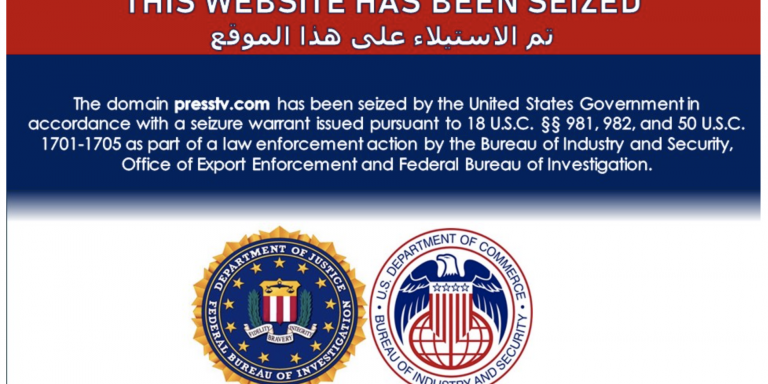INTELBRIEF
July 1, 2021
IntelBrief: U.S. Shuts Down Iranian Websites

Bottom Line Up Front
- The Biden administration shut down of Iranian media websites demonstrates its intent to counter all aspects of Iran’s objectionable behavior, even as it continues negotiations on nuclear issues.
- The website seizures will likely have a minimal effect on Iran’s efforts to promote its positions and disparage the United States and its allies.
- The U.S. move to block certain Iranian media sites was explained as an enforcement of applicable U.S. sanctions against Iran.
- Iran seeks to exploit the website shutdowns as indicators of U.S. hypocrisy on free speech and anti-Islamic and anti-Iranian bias.
On June 22, the United States Department of Justice (DOJ) announced that, pursuant to court orders, U.S. law enforcement authorities seized thirty-three website domains linked to Iran’s state media and related media operated by regional armed factions with ties to the Islamic Revolutionary Guard Corps Quds Force (IRGC-QF). U.S. officials claim websites were shut down for association with terrorist disinformation activities or violent organizations in violation of U.S. sanctions. The seized Iranian websites were under the supervision of the Iranian Islamic Radio and Television Union (IRTVU), including the prominent Iranian news network Press TV, and the Arabic-language Al Alam, both popular with Arab Shias throughout the region. Three websites seized were operated by Kata’ib Hizballah (KH), an Iraqi Shia militia whose previous leader, Abu Mahdi al-Muhandis, was killed alongside the revered IRGC-QF commander Qasem Soleimani in a January 2020 U.S. air strike. The official U.S. statement on the shutdowns described KH as a terrorist organization that commits, directs, and supports acts of violence against U.S.-led Coalition and Iraqi Security Forces, and stated that the IRGC-QF provides lethal support to KH and other Iraqi Shia militia groups who target and kill Coalition and Iraqi Security Forces. The website of Al Masirah, run by another Iranian ally, the Houthi movement in Yemen, as well as the site of LuaLua TV, run by Bahraini Shia dissidents supported by Iran, were also reportedly seized.
The U.S. seizure announcement asserted that components of the Iranian government, including IRTVU and others like it, “disguised as news organizations or media outlets, are targeting the United States with disinformation campaigns and malign influence operations.” Although not necessarily characterizing the Iran-led media outlets as the DOJ statement does, most experts agree that Iran and allied media broadcast material that paints the U.S. as a regional hegemon and a supporter of the oppression of Shias and Islamist groups in the region. Yet, the timing of the seizure raises questions for experts, insofar as the content of Iran-led media has been relatively consistent and had not changed recently. It can be argued that the Biden Administration is seeking to demonstrate its willingness to act against Iran’s objectionable behaviorand rebut critics of the Administration’s entry into negotiations with Iran to re-enter the 2015 multilateral nuclear deal abrogated by President Trump. However, the seizures only applied to websites hosted by U.S. companies, and Iranian and allied media can use websites hosted outside the U.S. to continue their broadcasts. The practical effect of the seizures on Iran’s messaging and propaganda operations is therefore likely to be limited.
Although the U.S. action was intended to demonstrate resolve against Iran’s anti-U.S. actions, the seizures were couched as enforcements of longstanding U.S. sanctions against the IRGC and its regional allies. The IRGC, the IRGC-QF, KH, and the IRTVU have been designated by the U.S. as entities that support acts of international terrorism. The Houthis were designated as a foreign terrorist organization (FTO) in the final weeks of the Trump administration, a designation quickly revoked by the Biden administration, though several major Houthi leaders remain designated as terrorism supporters. In October 2020, IRTVU was designated as a FTO on the grounds that it is owned or controlled by the IRGC-QF. Entities designated for sanctions under various U.S. laws and executive orders are subject to the blocking of their U.S.-based property if they obtain services, including website and domain services, in the U.S. without a specific license from the Treasury Department. The cited media organizations did not have Treasury Department licenses, and the U.S.-hosted websites of the sanctioned entities constituted U.S.-based property that could be seized.
Even though the website seizures are predicated on American legal grounds, Iran is using the action to reinforce its message that the U.S. applies double standards when formulating its policies in the region. Iranian media criticized the seizures as an indicator of U.S. hypocrisy in its promotion of free speech domestically and worldwide, asserting that its media organs express opinions and foster honest discussions of U.S. policy in the region. Iran has also portrayed the move as evidence that the U.S. is opposed to Iran, its regional allies, and regional Islamic movements because of their outspoken criticism of U.S. policy and the policies of its allies, such as Israel and Saudi Arabia. The website seizures likely will prove ineffective in limiting Iran-led media influence, while also providing Iran with additional ammunition for—and possibly some new adherents to—its arguments against U.S. policy in the region. And, in order to balance the move with more kinetic options designed to deter Iran, the Biden administration may launch more strikes similar to those earlier this week where the U.S. targeted Iran-backed militias operating in Iraq and Syria.